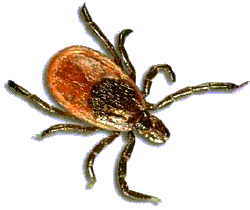| April
24 (CBS HealthWatch)--They are two doctors: an orthopedic surgeon and a
respiratory therapist. Both were healthy. Both volunteered to be inoculated
with a Lyme Disease vaccine approved by the federal Food and Drug Administration
(FDA). But within 24 hours of getting a second dose of the vaccine, LYMErix,
both men had severe swelling and arthritis in their hands.
"And we have no
reason to believe that it was anything but the vaccine involved in the
development of arthritis," explained Paul Fawcett, MD, Director of
the Immunological Laboratory at the Alfred I. DuPont Institute in Wilmington,
Delaware, in a speech at the 14th International Conference on Lyme Disease
and Other Tick-Borne Disorders, held April 21-23 in Farmington, Connecticut.
"Unless you are
in a very high risk group, I would not get this vaccine. Put it this way,"
he added, "I could have gotten it for free, but I didn't." About
200 listeners--including doctors, nurses, scientists and Lyme sufferers,
some of the latter attending in wheelchairs or aided by canes--applauded
his advice.
While LYMErix was not
the only topic discussed this past weekend at the international scientific
conference on Lyme Disease, it was the prime subject stirring ire for
professionals and patients alike. When pharmaceutical giant SmithKline
Beecham sought approval in 1998 to distribute the vaccine, several members
of the FDA's advisory board expressed strong concerns that LYMErix could
for some people actually cause Lyme-related arthritis and other symptoms.
But the vaccine was approved anyway.
"The bottom line
is monkey business at the federal level pushed this vaccine through, not
giving it fair and balanced and scientific consideration," claims
Karen Vanderhoof-Forschner, founder of the national Lyme Disease Foundation
and author of the book, Everything You Always Wanted to Know About Lyme
Disease (John Wiley & Sons, 1997).
The U.S. General Accounting
Office, an investigative arm of Congress, has launched an investigation
into whether some members of the FDA advisory committee that approved
LYMErix had "conflicts of interest," or financial factors that
might have motivated their approvals.
"That is one of
the issues we are examining," confirmed GAO Assistant Director Marcia
Crosse.
Some already have their
minds made up. "Absolutely, it was political. You can make a lot
of money with vaccines," says Janet Humes, a 44-year-old geologist
and member of the Massachusetts Lyme Disease Advisory Council to the state
Department of Public Health. "We are all lab rats," adds Humes,
who contracted Lyme from a tick 25 years ago.
Distribution of LYMErix
began in January 1999. About 1.3 million doses have been sent to doctors'
offices. There is no information on how much is still sitting on shelves
and how many have actually been vaccinated, but a company spokesperson
said it is assumed some 400,000 people have gotten the vaccine, which
is given in three doses over a year.
But more than a 1,000
previously healthy people who received LYMErix developed disorders after
being vaccinated, experts at the conference say. The complaints range
from arthritis to paralysis, partial blindness, fatigue and "brain
fog" or confusion.
There's no direct evidence
that LYMErix is responsible. Still, some are calling for its removal or
a moratorium on its use until long-term studies can be completed.
Lyme Disease, first
recognized in the 1970s and traced to ticks, has since become the most
common insect-borne disease in the United States. Within days of being
bitten, a victim usually develops a bull's-eye rash at the site. Symptoms
include joint pain, nerve palsy, chills, fever, headache and fatigue.
In most people, early stage Lyme can be cured with antibiotics. Left untreated,
Lyme can lead to conditions including debilitating arthritis and mental
disturbances.
Yet, if it is generally
treatable with antibiotics, why take a chance with a vaccine? Some tick
bites go unnoticed, said James Miller, MD, a microbiology and immunology
professor at the University of California at Los Angeles. "By the
time the person comes in and gets a diagnosis, they may already have arthritis,"
he warns. But would he line up for LYMErix? "No, I wouldn't take
it," says Miller.
SmithKline says the
concerns about LYMErix are all unfounded, though.
"We have every
confidence in the safety and efficacy of this vaccine," said company
spokesperson Carmel Hogan.
"There is no scientific
evidence" that the illnesses recipients are developing are a result
of the vaccine, she added. Indeed, SmithKline has applied for approval
to give the vaccine to children. LYMErix is now approved only for people
aged 15 to 70.
Bernard Hoet, MD, a
physician for SmithKline, said data show the number of people developing
arthritis and other maladies after the vaccine is no greater than it is
in the general unvaccinated population. "We do not consider arthritis
cases (to be) associated with the vaccine," said Hoet.
And even some doctors
who say they've seen recipients develop "what seems to be identical
to chronic Lyme" say that doesn't mean all efforts with LYMErix should
be halted.
"I'm not sure
we should throw the baby out with the bathwater," said Sam Donta,
MD, of the Boston University School of Medicine. "The FDA should
have made a decision to be a little more cautious with its recommendations
for the vaccine."
©2001 by Medscape
Inc.
For
a reality check, read Common Causes' Marjorie Tietjen's article, Challenging
Quackwatch’s Position on Lyme Disease
|
